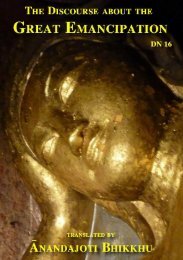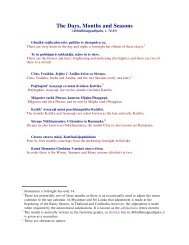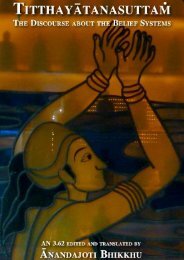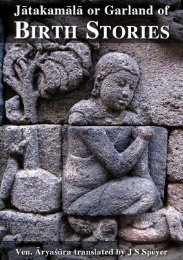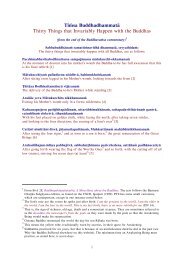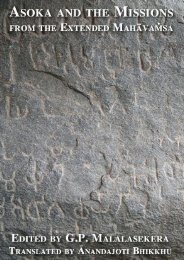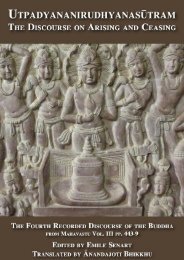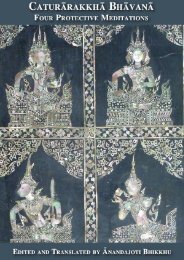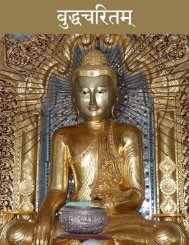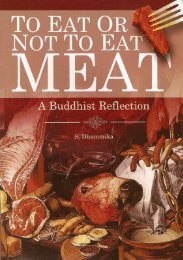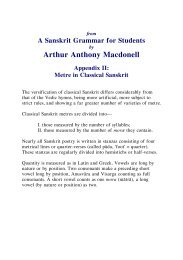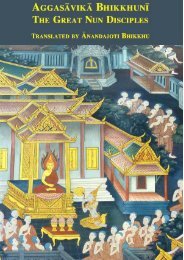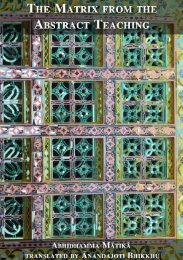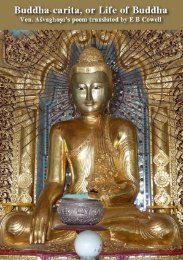MahÄkhandhako The Great Chapter - Ancient Buddhist Texts
MahÄkhandhako The Great Chapter - Ancient Buddhist Texts
MahÄkhandhako The Great Chapter - Ancient Buddhist Texts
You also want an ePaper? Increase the reach of your titles
YUMPU automatically turns print PDFs into web optimized ePapers that Google loves.
Tena kho pana samayena te jaṭilā,<br />
<strong>The</strong>n at that time those yogis,<br />
<strong>The</strong> <strong>Great</strong> <strong>Chapter</strong> - 140<br />
[Mandāmukhipāṭihāriyaṁ]<br />
[34: <strong>The</strong> Coal-Pan Miracle]<br />
sītāsu Hemantikāsu rattīsu antaraṭṭhakāsu himapātasamaye,<br />
in the cold Winter nights, in between ‘the eights’, 184 at the time of the snowfall,<br />
najjā Nerañjarāya, ummujjanti pi nimujjanti pi,<br />
in the river Nerañjarā, were plunging in, and plunging out,<br />
ummujjanimujjam-pi karonti.<br />
were plunging in and out.<br />
Atha kho Bhagavā pañcamattāni mandāmukhisatāni abhinimmini,<br />
<strong>The</strong>n the Gracious One created about five hundred coal-pans, 185<br />
yattha te jaṭilā uttaritvā visibbesuṁ.<br />
where those yogis, after emerging, warmed (themselves).<br />
Atha kho tesaṁ jaṭilānaṁ etad-ahosi:<br />
<strong>The</strong>n this occurred to those yogis:<br />
“Nissaṁsayaṁ kho Mahāsamaṇassa iddhānubhāvo<br />
“No doubt it is because of the <strong>Great</strong> Ascetic’s psychic power<br />
yathā-y-imā mandāmukhiyo nimmitā.” ti<br />
that these coal-pans were created.”<br />
Atha kho Uruvelakassapassa jaṭilassa etad-ahosi:<br />
<strong>The</strong>n this occurred to the yogi Uruvelakassapa:<br />
“Mahiddhiko kho Mahāsamaṇo mahānubhāvo,<br />
“Powerful and majestic is this <strong>Great</strong> Ascetic,<br />
184 <strong>The</strong>re is a partial parallel to this section at Udāna 1.9, from my translation of which the<br />
following note is taken: “the eights (aṭṭhakā) refers to the eighth day after 3 of the Full<br />
Moons in Hemanta, i.e. at the coldest time of the year, at which times there were festivals<br />
when the brāhmaṇas worshipped their ancestors (see SED, aṣṭakā). Antaraṭṭhake therefore<br />
means between these times. See BHSD, s.v. aṣṭaka-rātri (on Lalitavistara 251.6) and CPD s.v.<br />
atthakā, antaraṭṭhaka. <strong>The</strong> Commentary says that aṭṭhakā means the last four days in Māgha<br />
and the first four in Phagguṇa, in the season of Sisira, which shows an unexpected<br />
ignorance of brāhmaṇical festivals, and is certainly wrong”.<br />
185 Comm: mandāmukhiyo ti aggibhājanāni vuccanti.



